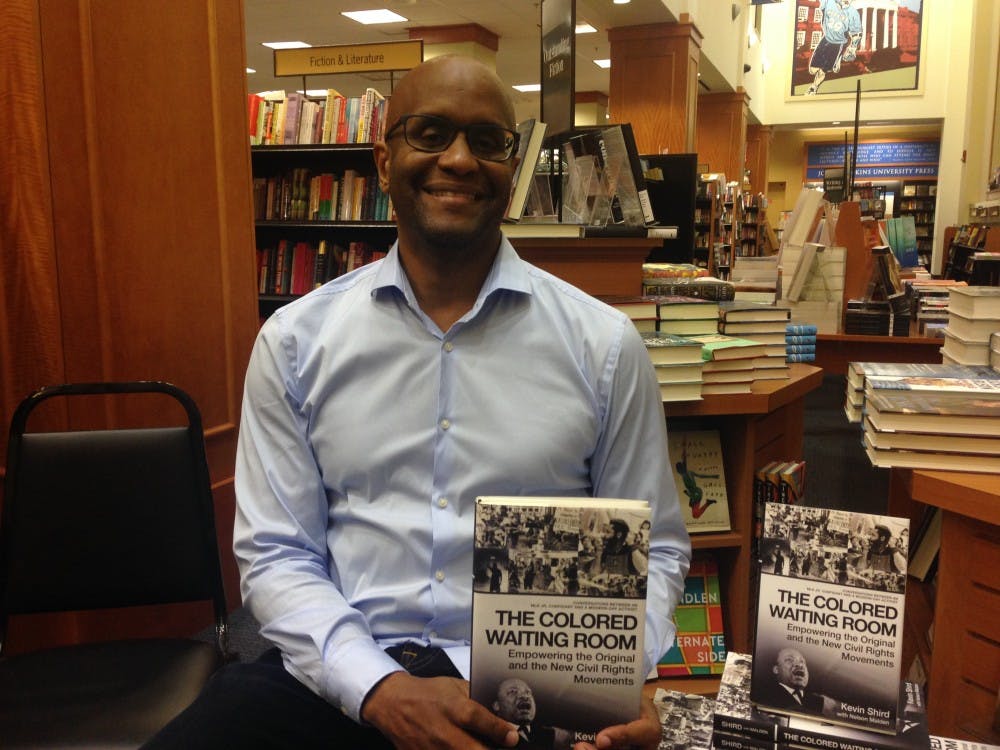Kevin Shird, an activist and associate professor at the Hopkins Center for Medical Humanities and Social Medicine, discussed his recently-released book, The Colored Waiting Room, at Barnes & Noble on Thursday, Oct. 4.
The book, a nonfiction work of oral history that combines Shird’s voice with first-hand stories from the American civil rights movement, was released in March of this year. It draws heavily upon the personal experiences of Nelson Malden, the former barber of many civil rights leaders including Martin Luther King Jr.
Malden, now 85 years old, is listed as the secondary author of the book. During his talk, Shird emphasized that Malden’s knowledge and memory was integral to creating the project.
“Nelson was like an encyclopedia of information,” Shird said. “He was like his own World Wide Web when it came to the American civil rights movement.”
Although not a civil rights leader himself, Malden has enjoyed widespread respect as a community figure in Montgomery, Ala. for much of his life. His business, known as College Hill Barber Shop during the civil rights period and now called Malden Brothers Barber Shop, was an important hub of social and political activity.
“The barber shop was one of the most popular places, if not the most popular place, in town for black men to congregate,” said Shird. “Leaders came to the barbershop, they planned these civil rights marches and actually planned strategy to come together and talk about the next idea or next move they were going to make.”
In 1966, Malden, at the behest of Rosa Parks’ lawyer, ran for political office in Montgomery. He was the first black man ever to do so, only one year after the passage of the Voting Rights Act.
“He knew that his life could be in danger, but he did it anyway,” Shird said. “The campaign was ultimately unsuccessful and never held political office. However, this served as an important step in the racial history of the city.
Shird expressed hope that Malden’s experiences would contribute to a more nuanced understanding of the civil rights era for students today.
“If you’re 15 years old, you’ve seen three presidents in your whole life... and the longest term, if you’re 15 years old right now, is Barack Obama. And so for you, having a black president is a normal thing,” Shird said. “A young person’s perspective on that history, a young person’s perspective on race in America, it’s a lot different than maybe a 50, 60, 70-year-old.”
Shird and Malden have given away a set of 300 copies of The Colored Waiting Room to Digital Harbor High School in south Baltimore, where Malden also gave a talk after the book’s release. Shird recalled that, despite the vast age difference between Malden and his audience, his personal recollections interested the students.
“The kids were glued to the conversation,” recalled Shird. “They were fascinated and really excited about it.”
Shird also spoke about how Malden’s stories encouraged him to look at the history of the civil rights movement in a new way that included intricate, personal details and connections to his own identity.
“For me, being an African-American man from Baltimore... even just being an American, now I have this fascination with this history,” said Shird. “It’s almost like this Pandora’s box.”
Born and raised in Baltimore, Shird began dealing drugs at the age of 16 and spent 12 years in prison before becoming an author and activist.
“Just listening to [Malden’s] stories and listening to what motivated him was actually also one of the things that motivated me to write this book,” Shird said. “If I had had a person or thing who could have motivated me to want to... do great things in the world, would I have made different decisions in my life?”
Now, Shird hopes that the joint effort between himself and Malden can inspire people to reconsider the role that the civil rights movement, and black history in general, play in the American education system.
“I feel strongly that it should be more a part of the school curriculum. You don’t have to be a rocket scientist to find information on the American civil rights movement,” he said. “If you want to go look for it, you can find it.”





